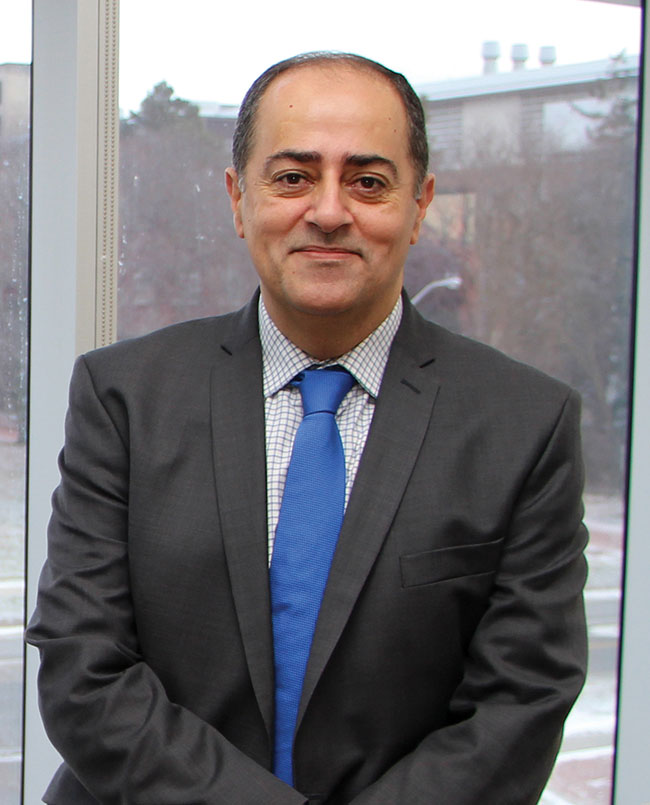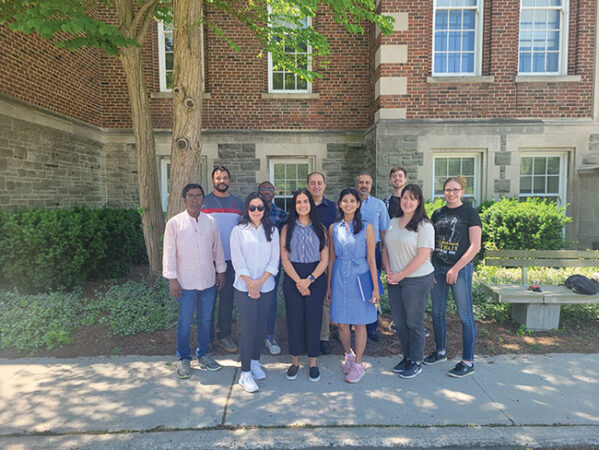
Dr. Shayan Sharif: a veterinarian and professor making waves in poultry health and research
By Lilian Schaer
Features ResearchersThe veterinarian and professor has had a remarkable career in poultry health and research. In this article, we detail his journey.
 This year alone, Dr. Shayan Sharif completed approximately 40 media engagements, offering objective information on the avian influenza outbreak.
PHOTO CREDIT: Dr. Shayan Sharif
This year alone, Dr. Shayan Sharif completed approximately 40 media engagements, offering objective information on the avian influenza outbreak.
PHOTO CREDIT: Dr. Shayan Sharif Dr. Shayan Sharif has had a remarkable career in poultry health and research. He’s a veterinarian and professor at the University of Guelph focusing on poultry immunology, as well as serving as the Associate Dean of Research and Graduate Studies at the Ontario Veterinary College.
Over the last two years, he’s also become a leading media spokesperson and commentator on Avian Influenza as the North American industry continues to grapple with the current outbreak. This year alone, he’s already completed approximately 40 engagements with mainstream TV, radio and print outlets, offering objective information on the outbreak and what it means for Canadians.
As proud as he is of his academic work, however, Sharif’s true passion lies in working with people and training the next generation of poultry industry scientists and decision-makers.
“Everything I’ve done, I couldn’t do without the students and staff who come out of my lab, and many are now policy makers or in academia in many different places in Canada, the United States or worldwide,” he says, adding he feels strongly about taking on a mentorship role and fostering their career development.
“I’m trying to help them achieve their goals and objectives and this is in a sense my calling, to facilitate and be the person who is between them and the next phase of their career,” he says.
Early interest
Growing up in Iran, Sharif’s interest in anatomy started at a young age when a frog necropsy and the differences between diseased and healthy tissues caught his attention. This led him to the University of Tehran’s Faculty of Veterinary Medicine, where courses in virology and immunology piqued his interest in the phenomenon of genetic resistance to infectious diseases. There, he completed his DVM thesis on the immunological aspects of Marek’s disease in poultry.
After working as a poultry veterinarian for several years, a fascination with Major Histocompatibility Complex (MHC), which determines mammals’ and chickens’ susceptibility and resistance to disease, brought him to Guelph, one of the only places in the world at the time where work on MHC and its association with disease was being done.
“Nobody was studying MHC in chickens at Guelph – all the people working in this field where at the Canadian Food Inspection Agency lab in Ottawa at the time – so that became my focus,” he recalls.
Poultry research at Guelph
After leaving Guelph to complete a post-doctoral fellowship, he returned in 2001 to join the Poultry Industry Council-funded Poultry Program Team and establish a research program in poultry immunology.
Today, his lab focuses on three main research areas: immunity and vaccine development for Marek’s disease and Avian Influenza, and development of probiotics for enhanced immune responsiveness and gut health in poultry.
Mentorship
For Sharif, though, the many students and staff – or early career colleagues, as he likes to call them – that he has worked with over his more than two decades at Guelph count as the main highlight of his career.
Sugandha Raj has just accepted a post-doc position with Sharif after completing her PhD in his lab and speaks highly of how he encourages his students to think outside the box, stay on top of cutting-edge scientific research, and take advantage of industry networking opportunities.
“He is truly a great teacher and mentor. The most amazing thing is his patience and resilience – even if you are not at your best, he is very understanding and supports you in ways that humble you,” she says.
Khaled Abdelaziz, who today is an Assistant Professor of Immunology at Clemson University and a Faculty Scholar at Clemson University School of Health Research in South Carolina, joined Sharif’s lab as a postdoctoral fellow in 2014 and flourished under his professor’s inspiration, support and guidance.
“I remember in my first meeting with him he said, “Khaled, your success is my success”. These were not just words because Dr. Sharif kept supporting me even after I became an independent investigator,” he recalls. “Dr. Sharif is very generous with his time and always shares information, experience, and knowledge with his team. He supports his mentees not only throughout their graduate programs, but also throughout their career life.”
Ravi Kulkarni worked with Sharif in various capacities at the University of Guelph between 2004 and 2018, appreciating his guidance in career development and research achievement. Today, Kulkarni is an Assistant Professor in Population Health and Pathobiology at North Carolina State University’s College of Veterinary Medicine.
“He is a visionary leader, a great listener and someone who gives ‘space’ to everyone to share their viewpoints and ideas,” Kulkarni says.

Sharif, pictured here with his lab team, says his true passion lies in training the next generation of poultry industry scientists and decision-makers.
PHOTO CREDIT: Dr. Shayan Sharif
Progressive poultry industry
Throughout his career, Sharif has always been impressed by the progressive nature of the Canadian poultry industry and its ability to respond and adapt to adversity, such as Avian Influenza. The industry sprang into action following the 2004 Avian Influenza outbreak and both the scientific advances and the general widespread improvement in disease preparedness and response have kept the current outbreak from being much, much worse, he says.
He’s also appreciated the level of support he’s continually received for both his research and for training new generations of poultry scientists.
“When I first came to the poultry program team, I realized how progressive the Canadian poultry industry was – and the level of support I have received from the poultry industry really showed me how dedicated and devoted the industry is to generating new knowledge for the poultry industry as a whole and also to create platforms and environments to train new generations of poultry scientists,” he says.
“This has attracted me and kept me here in Guelph and is one of the main reasons I felt I got the best of the best,” he adds. “This juncture between industry and academia you can hardly find anywhere else.”
Looking to the future, Sharif believes strongly in the industry’s continued capacity to evolve and adapt, and he has some ideas about how he’d like that to unfold.
This includes creating sustainable programs to prepare the next generation of poultry industry workers and managers with job-ready skill sets, training more poultry veterinarians to give the industry the capacity for good antimicrobial stewardship, and developing better strategies for disease surveillance, predicting emergence of new and more deadly microbes, like avian influenza virus, and suppressing them before they become a global animal or human health problem.
Making headlines
In recent years, Sharif has been one of the leading media spokespeople and experts on avian influenza:
- This year alone, he’s already completed approximately 40 engagements with mainstream TV, radio and print outlets.
- He provided objective information on the outbreak and what it means for Canadians.
- He argued for a One Health approach to the virus, which places equal importance on measures that address avian influenza virus from animal, human and environmental health perspectives.
Print this page